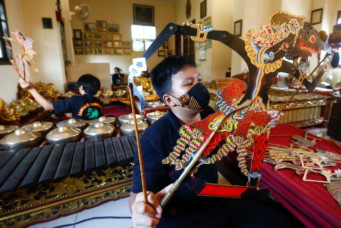Theater Spotlights Social Trauma and Sexual Harassment
How theater can be used to generate community dialogue and set the stage for social change.
A supporter holds a #MeToo sign outside a court for a sexual harassment case in Beijing, China December 2, 2020. Florence Lo/Reuters
The Cairo Review’s reporter-researcher Ibrahim Elzayat and assistant editor Omar Auf sat down with Jillian Campana, a professor of theater at the American University in Cairo (AUC) and author of the book “Western Theater in a Global Context: directing and teaching culturally inclusive drama around the world.”
The conversation touched on Campana’s experiences at the intersection of theater and social science in local and global contexts. Campana uses drama to address trauma while raising awareness about important issues such as sexual harassment in non-Western contexts. This is part one of a two-part interview, please see part two here.
Cairo Review: What does theater mean to you?
Jillian Campana: I consider it a social science, a way to study ourselves’ and others’ humanity and culture. I think it’s a way of bringing a case study or something that might be written down or conducted via quantitative research, and looking at the information that is gathered in theater as a sort of research into humanity and how we function as a society and individuals. We do this by embodying characters and performing stories. I look at it like we’re collecting the data as we write a play, or devise a new piece of material, or even rehearse a previously published work. Then we’re analyzing the data in the rehearsal process, and then when we share our performance with an audience, we’re sharing the data. I look at it as a participatory action type of research, and very intertwined with the social sciences.
CR: Do you believe that the added narrative quality enhances people’s ability to relate to the topics at hand?
JC: When we read a piece of literature, we connect with it in a particular way, but when we watch something unfold, when we watch bodies in space, and facial expressions, there’s a different connection that we have to that material. It’s taking something that’s written and it’s bringing it to an oral and visual component. We tend to mirror the things that we’re seeing, so that happens with our facial expressions, but also with our ability to empathize. When we’re watching a performance, we identify with one character, and we feel the things that they feel. And then perhaps when the play is over, we can make a change in our behavior or our way of thinking based on what we’ve experienced in that sacred theatrical space.
CR: Does it make people more empathetic towards the issues at hand?
JC: I think it does. I think it definitely makes audience members connect to issues more. Whenever we’re connected to something we experience more empathy. We don’t feel empathetic toward something we don’t understand.
CR: What does that intersection of theater and social science look like? And what are the dynamics of theater as an element in the public space?
JC: A lot of the work that I do is particularly interested in traumatic experiences that people have. I’m interested in that because that is how we grow and change. Things that happen to us, that come against us like a blunt force, cause us to completely alter the way that we have existed previously, and the way that we see the world in which we live. So I’m interested in theater as a tool to deal with traumatic experiences, both to showcase traumatic experiences in a theater play for the audience to understand more acutely, but also for participants to use drama as a way to unpack a traumatic experience that they have had.
I use those words, drama and theater, very differently. Theater is a performance specifically for an audience, whereas drama can be non-product based. It doesn’t necessarily need an audience. It can be people investigating roleplay without anyone watching them, for their own purposes. For their own knowledge.
CR: What role do you see for theater in Egyptian culture?
JC: I think that Egyptians really appreciate live theater. Western theater was forced onto Egypt with colonization, but there are beautiful Egyptian traditions, “khayal al-zil” is a beautiful ancient form of puppetry, and the “halqa” is Middle Eastern storytelling, which is very performative. Those are entrenched in the way that plays happen today. But then also the dominance of Western theater all over the world has been such a force to be reckoned with that, a lot of times, local performances and local traditions are not taught as much as Western theater or Western scripts.
When I go to a play here, I feel like there’s more of an intersection between the audience and the performers than there is in the West. In the West, we’re told we really have to be quiet and we just look and we don’t watch the other people around us as much. And when I go to a performance here, there’s a very different energy that’s in the room and it feels almost like the audience members are a part of the play. People laugh out loud or get up and leave if they need to and come back. I really enjoy that it feels like it’s more communal.
CR: The theater department at AUC has begun to use its resources to tackle sexual harassment. The student led play “You W-ana Too” focuses on addressing how sexual harassment is perceived by different members of society in Egypt. How can you successfully raise awareness and change attitudes when it comes to sexual harassment?
JC: We now have a new title for it, “Mish Zanbik” (it’s not your fault). We changed the title actually just this week, because “You W-ana Too” was reflective of the Western-based Me Too movement. Not everyone is familiar with that, and it has different connotations. So we wanted to place it specifically within Egypt. It’s a collection of new plays written by young Egyptian men and women looking at the issue of sexual harassment and assault from multiple perspectives. So it looks at, for example, how a family might deal with the situation if a member of the family has had an experience with sexual harassment. How a father might see his his daughter differently if she tells him about harassment that she’s experienced, and how he might understand that and how their relationship might change. One of the plays focuses on the post-traumatic stress disorder that exists for people who have experienced sexual harassment or sexual assault – how it really doesn’t actually leave them, becoming part of who they are. We’re performing this play outside on both campuses, New Cairo and Tahrir, and the five plays will happen simultaneously, so audiences will be grouped into small clusters, going around and watching each one of the five plays, and then they’ll rotate. It’s a perfect process for this pandemic era when it’s really hard to pack bodies into a theater space.
Audience members will walk from one place to another. It’s a short distance, but I’m hoping that as they watch one play, and then they walk to the next play, this process of moving one’s body helps us process material that we’ve taken in, and move on to the next play with maybe a series of questions or thoughts about the issue. And of course, when we’re walking, we have a short break in between each play, so there’s the opportunity to talk to other people who also watched the play. This actually allows us to have more dialogue about what we’re watching.
CR: Do you believe that you would need to change this play for a non-AUCian audience?
JC: We’re really trying to cover multiple perspectives, including gender, but also social class and economic ability. These plays are written by AUC students, but we’ve tried to do as much homework and research as possible. Looking at, for example, the ways in which someone who has some economic privilege might have more access to, for example, counseling, than someone who doesn’t. When a person comes from a place where they’re disadvantaged economically, they lose their voice. They don’t have the ability to speak up as much. They don’t have the ability to alert the rest of the world to the problem they’re experiencing. And so we’re really trying with this particular play to bring about an awareness of how sexual harassment and sexual assault impact all all sectors of Egyptian society.
Jillian Campana is a professor of theater at The American University in Cairo, where she also serves as the Associate Dean of the School of Humanities and Social Sciences. Having earned an interdisciplinary Ph.D in theater and the social sciences, her research and creative work look at drama and theater as tools to build community, equality, and identity. She has developed several theater projects around the world, including programs for persons living with brain injuries in Sweden, victims of sexual trafficking in India, and victims of sexual harassment in Egypt.




